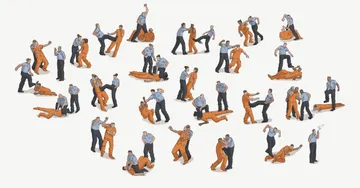The Pakistani witnesses, one after another, told the same story. For two years, Hamid Hayat never left their rural hamlet for more than a few days. He wasted his time playing video games and cricket instead of studying. He certainly never left to train with terrorists.
“If he had disappeared, would you have known?” Hayat’s lawyer, Dennis Riordan, asked Muhammad Anas.
“Naturally, I would have noticed,” said Anas, who is Hayat’s uncle.
Anas, a bespectacled, bearded teacher, peered into the Sacramento courtroom from an enormous video monitor. He was more than 7,000 miles away in a law office in Pakistan’s capital, Islamabad.
The testimony, held in federal court in February, was a judge’s unusual resolution of a heated dispute in a high-profile terrorism appeal: How should a court handle a defendant’s request to present foreign testimony? The judge’s innovative answer — to let the Pakistani alibi witnesses appear by video — raises questions about how technology changes the search for truth.
“One of the things with the international dimension of terrorism cases is that it’s very hard for a jury to understand the logistics of another country,” said Karen Greenberg, director of the Center on National Security at Fordham University’s School of Law. “What these video testimonies do is enable the judge or jury to be able to get a much better feel for it. It’s important for the judge or jury to make sense of it in an international context.”
When Hamid Hayat, a U.S. citizen who was born in California, was arrested in 2005, his case made headlines because the FBI announced that he was part of an Al Qaeda “sleeper cell” operating in a rural California town. The U.S. Attorney eventually conceded that there was no Al Qaeda cell, but Hayat was accused of having trained at a jihadi camp in Pakistan to learn “how to kill Americans.” A jury convicted him of providing material support to terrorism and lying to the FBI.
Hayat’s trial lawyer was a rookie. Wazhma Mojaddidi was an immigration lawyer who’d never taken a criminal case. A Muslim advocacy group asked her to get involved after Hayat went to talk with the FBI and never returned. She represented him through the trial.
In a court filing, Hayat’s appeals lawyers called Mojaddidi’s work on the case “a travesty of justice.” She never applied for a security clearance, so she couldn’t see classified evidence against him — the heart of the government’s case — or participate in hearings about the evidence.
In the spring of 2003, Hayat traveled to Pakistan with his parents and siblings, who belonged to a close-knit community of Pakistani-Americans living in Lodi. The family often visited their ancestral village. Hayat claims he went to get married and that he never left his small village for more than a few days at a time and never alone. But prosecutors say that, sometime between October 2003 and November 2004, Hayat spent three to six months training at a terrorist camp. Hayat and his family returned to California in the spring of 2005. He was arrested a few days later. His father, Umer Hayat, an ice cream truck driver, was also arrested and accused of lying to the FBI. His case ended in a mistrial, and he eventually pleaded guilty to a customs violation. At the son’s trial, Mojaddidi didn’t investigate in Pakistan or present any alibi witnesses.
“Wazhma believed deeply in Hamid’s innocence and spent a year of her life doing her desperate best to defend him,” said Riordan, Hayat’s appeals lawyer. “But she didn’t know the depth of what she didn’t know, which was enormous. Most obviously, that she could have — and absolutely should have — obtained and produced in court the evidence from Pakistan that irrefutably would have proved his innocence.”
Mojaddidi, who declined an interview request, testified that she doesn’t believe she was ineffective and that her strategy was to push the government to trial as quickly as possible.
On appeal, Riordan investigated Hayat’s alibi. A lawyer in Pakistan gathered 18 sworn statements from villagers and family who described Hayat’s time in Pakistan. The witnesses also said that Hayat had suffered a nearly fatal bout of meningitis, which left him mentally slower and physically weaker than his peers, an unlikely candidate for jihad. They said he was too timid to travel alone, and that he only left the village to go with his mother to her medical appointments. Once, they said, he went to a wedding with friends.
Now, 11 years after Hayat first appealed his conviction, his case reached a judge who seemed intent on getting to the bottom of what happened in Pakistan. U.S. Magistrate Judge Deborah Barnes granted Hayat an evidentiary hearing, which could lead to a new trial.
She puzzled through the legal issues involved with the alibi witnesses. First, Hayat’s lawyers tried to bring some of the witnesses to court, but they were denied visas by the U.S. Department of State. There was little chance the government would allow any of the witnesses to travel to Sacramento.
Another option was for prosecutors and Hayat’s lawyers to go to Pakistan. But prosecutors objected to what they called “unnecessary depositions” that would require them to travel “halfway around the globe in one of the world’s most dangerous regions.”
Hayat’s lawyers suggested video conferencing, setting up a giant screen in the courtroom and using an Urdu translator.
Prosecutors, both in international tribunals and domestic courts, rely on foreign testimony and have used video conferencing. But a defendant using it raised a host of questions. For one, where would the testimony take place?
Prosecutors commonly arrange to use foreign courts to set up video conferencing. But Hayat didn’t have the U.S. government to help find a venue. His lawyers were on their own.
And, the judge wondered aloud, how would witnesses be sworn in? What were the consequences if a witness lied? Prosecutors objected to the arrangement. In court filings, they cited an Eleventh Circuit case, United States v. Alvarez, which involved a United States Coast Guard seizure of drugs hidden on a fishing boat in the Bahamas. The court ruled that the defendant hadn’t shown “exceptional circumstances” for taking the deposition of a witness in Aruba. It noted that foreign deposition testimony was “suspect” because the witness couldn’t face a penalty for perjury.
“What Mr. Riordan described is subjecting foreign witnesses to an American oath that would be meaningless to them, under which they would be subject to no penalty whatsoever, and under which there would be no enforcement mechanism,” said Assistant U.S. Attorney André Espinosa. “The government cannot extradite a person to the United States and charge that person for committing perjury in Pakistan when the lies are told in Pakistan.”
The judge suggested that perhaps the witnesses could be sworn in under local law.
“So would the government feel more comfortable if, in addition to taking an oath under U.S. law, these individuals took an oath under Pakistani law?” the judge said.
Prosecutors said they found this even more unpalatable.
“My understanding of some aspects of current Pakistani law, Pakistan is an Islamic republic, subject to religious law,” Espinosa said. “Women are not competent to testify in legal proceedings.”
The judge asked him what he based that on, and he said he would get back to her. (Courts in Pakistan operate under the common law system, developed under British colonial rule. Women may testify in legal proceedings.)
That moment illustrated one of the main points of Hayat’s appeal: Hayat is serving 24 years for attending a camp in Pakistan. Yet, the government presented no on-the-ground evidence from Pakistan at trial. Neither did Hayat.
“We think that in a case like this, where a critical question is the failure to present alibi testimony, it would benefit this court to actually see some of the alibi witnesses,” Riordan said.
The judge agreed. In her order granting video testimony, she noted that the legal argument about the witness testimony was likely far from over.
“The parties are free to argue the effect of the oath, and any penalties for false testimony, in their briefing after all the evidence is heard,” she wrote.
She scheduled two nights of testimony for the Pakistani witnesses, using an encrypted federal court videoconferencing system. Because of the time difference, she held court at night.
The first night, court security officers let Hayat’s family, a reporter and a local Muslim leader into the court building. The hallway lights were off, creating an eerie feel. There was a momentary panic when the judge realized that no one had remembered to leave the air conditioning on. Court staff quickly fixed it.
The witnesses told consistent stories. Hayat’s uncle Dr. Fahim Ud Din, a pediatrician, and his wife, Tayyaba Fahim said that it was impossible Hayat attended a terrorist camp. Both said they would have testified at his trial.
“As God is my witness, I have not seen him alone anywhere,” Dr. Fahim said. “I have never seen him alone in any public transport. His family would be with him or his very close friends.”
The village tailor, Rifaqat, who gave only his first name, appeared on video in a dapper blue suit with a white pocket square. Hayat’s friend since childhood, he said the pair had gone to a wedding together in 2003. Hayat often stopped by the tailor shop to chat.
“Hamid was a very simple guy,” he said. “You know, we would just talk, but he was not, like, a cruel-hearted person. He was not like that.”
Once, during the testimony, the Internet connection cut out for about 20 minutes. Occasionally, cars could be heard honking in the background, but the images were clear.
Riordan said he was pleased with the experiment.
“Using video conferencing was apparently unprecedented, but, as the hearings proved, it could be done well and effectively,” he said.
Hayat’s family said they were relieved by the video testimony. They said it felt like the court was finally trying to understand what happened in Pakistan.
During a break in the testimony one night, Hayat’s sister, Raheela Hayat, sat in the hallway outside the courtroom, rocking her young son to sleep.
“There’s a different feeling this time,” she said. “If he’d gotten this the first time, maybe he wouldn’t have gone to prison.”

